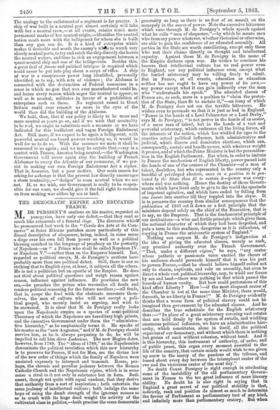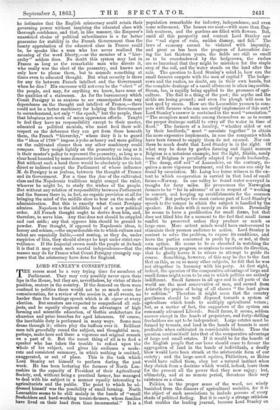THE DEMOCRATIC EMPIRE AND EDUCATED FRANCE.
IVIDE PERSIGNY'S orations on his master, regarded as • panegyrics, have only one defect,—that they read so much like rehearsals of a funeral eloge. The discourse whicif he pronounced last week to the " Cercle des Arts et du Com- merce" at Saint Etienne partakes more particularly of this dismal description of eloquence, being, indeed, in some sense a dirge over his own fall from power as well as a political blessing couched in the language of prophecy on the posterity of Napoleon—on " a Prince who shall be called Napoleon IV. or Napoleon V."—rather than on the Emperor himself. But, regarded as political essays, M. de Persigny's orations have probably more than one political defect. Still, there is one so striking that to English eyes, at least, it eclipses all the others. He is not a politician but an apostle of the Empire. He does not think about political questions and weigh reason against reason, influence against influence. He proclaims the new era,—he preaches the prince who reconciles all feuds and renders political reasoning for the future needless ;—all feuds, that is, except the feud with the obstinate reasoners them- selves, the men of culture who will not accept a poli- tical gospel, who meanly insist on arguing, and wish to be answered. It is clear that M. de Persigny really looks upon the Napoleonic empire as a species of semi-political Theocracy of which the Napoleons are hereditary high priests, and the executive Government under them the " administra- tive hierarchy," as he emphatically terms it. He speaks of his master as the "new Augustus," and if M. de Persigny should survive him, as he is always preparing to do, he will be impelled to call him divas Ludovicus. The new Hegira dates, however, from 1789. The " ideas of 1789," as the Napoleonists denominate the political revelation which this new hierarchy is to preserve for France, if not for Man, are the divine law of the new order of things which the family of Napoleon were anointed expressly to interpret and transmit. Hence, per- haps, the chronic and peculiar jealousy between the Roman Catholic Church and the Napoleonic regime, which is in some sense a rival to it not only in substance but in form. Both assert, though not quite with equal candour, that they derive that authority from a sort of inspiration ; both entertain the same jealousy of intellectual culture ; both indulge the same hope of using the dumb strength of the ignorant masses so as to crush with its huge dead weight the activity of the cultivated class in politics,—both practise the same democratic generosity so long as there is no fear of an assault on the monopoly in the source of power. Note the excessive bitterness which runs through M. de Persigny's whole speech against what he calls " men of eloquence,"—by which he means men who from any power whatever, whether rhetorical or otherwise, are able to gain the confidence of an educated assembly. All parties in the State are worth conciliating, except only those who rest their claims directly on thought and intellectual capacity. Against these M. de Persigny in the name of the Empire declares open war. He wishes to convince his hearers that intellectual culture has no real power even in England, nor any political influence even, except what the landed aristocracy may be willing freely to admit. But in France, at all events, education as education.: neither has nor ought to have any power of its own,— any power except what it can gain indirectly over the man who " understands his epoch." The educated classes of France are, as such, more in a position to " claim the protec- tion of the State, than fit to sustain it,"—an irony of which H. de Persigny does not see the terrible bitterness. He- wishes even to persuade us that it is just as bad in England. "Power in the hands of a Lord Palmerston or a Lord Derby," says M. de Persigny, "is not power in the hands of an orator,. of a mere man of talent, but in the hands of a vast and powerful aristocracy, which embraces all the living forces, all the interests of the nation, which has wielded for ages in the- counties actual political influence, both administrative and judicial, which directs and dominates elections, which can, consequently, sustain and handle power, with whatever weight it presses, and of which the Prime Minister is but the personifica- tion in the English Parliament. But when, in order to imitate in France the mechanism of English liberty, power passed into the hands of one of the orators of the Chamber—of a man of talent, doubtless, but who represented in the country only a. handful of privileged electors, more in a position to be pro- tected by the State than fit to sustain it—power was every- where and was nothing. Hence the destiny of those Govern- ments which have lived only to give to the world the spectacle of impotent agitation, and which have ended by falling from one hirsute into another till they toppled into the abyss. It is to preserve the country from similar consequences that the- plehiscitunt of 1851 set it down as a first principle that the ministers depend solely on the chief of the Executive, that is- to say, on the Emperor. That is the fundamental principle of our institutions—a wise and fertile principle which gives them the national character of which they had been despoiled, and puts a term to this madness, dangerous as it is ridiculous, of- copying in France the aristocratic system of England." Nothing can surpass M. de Persigny's indignation at. the idea of giving the educated classes, merely as snob, any practical authority over the French Government. "That, under a different regime," he says, "any orator- whose pathetic or passionate voice excited the cheers of- his audience should persuade himself that it was his part to govern France,—that he should believe himself suited not only to charm, captivate, and rule an assembly, but even to direct a whole vast political hierarchy, nay, to wield our forces- by sea and land—there was nothing in that which passed the- bounds of human vanity. But how could pretensions of this kind affect Liberty ? How !—if the most eloquent orator of" the Chamber is not at the same time Minister, there would,. forsooth, be no liberty in France ! " M. de Persigny evidently thinks that a worse form of political slavery could not be- imagined than government by the educated classes. And he describes the true substitute for the English aristocracy thus :—" In place of a great .aristocracy covering vast estates that are held firmly by the system of entails, and wielding- enormous political influence, we have an administrative hier- archy, which constitutes, alone in itself, all the political organismof our democracy, and without which there is nothing but grains of sand without cohesion, without bond. And it is this hierarchy, this instrument of authority, of order, and of public peace, this organ every moment essential to the- life of the country, that certain minds -would wish to see given up anew to the mercy of the passions of the tribune, and tossed about every day between the triumphant orator of the eve and the victorious orator of the nest day." No doubt Count Persigny is right enough in attributing some of the instability of the old parliamentary Govern- ment in France to the too great influence of mere literary ability. No doubt he is also right in saying that in England a great secret of our political stability is that, indirectly, rank and position do almost as much to determine - the favour of Parliament as parliamentary tact of any kind, and infinitely more than parliamentary oratory, But when he intimates that the English aristocracy could retain their governing power without inspiring the educated class with thorough confidence, and that, in like manner, the Emperor's unassisted choice of political subordinates is a far better guarantee for stability in the French Government than the hearty approbation of the educated class in France could be, he speaks like a man who has never realized the meaning of the word liberty,—as the member of a " hier- archy " seldom does. No doubt this system may last in France as long as the remarkable man who directs it, who really was the elect of the peasantry, and knows not only how to please them, but to concede something at times even to educated thought. But what security is there for any tie between French intellect and the Government when he dies ? His successor will not even be the " elect " of the people, and may, for anything we know, have none of the qualities of a statesman. As for the bureaucracy which Count Persigny is so anxious to see emancipated from any dependence on the thought and intellect of France,—there could not be a better machinery for helping the Government to misunderstand, not only " the epoch," but the people, than that laborious net-work of mean oppression affords. Taught to feel they have no responsibility except to their master, educated as political menials, who must feed their self- respect on the deference they can get from those beneath them, the French "hierarchy," whose duty it is to guard the " ideas of 1789 " impose a yoke as heavy and more galling on the cultivated classes than any other machinery could compass. They weigh lightly on the peasantry so long as it is their master's policy to represent the peasantry, so long as a clear head haunted by some democratic instincts holds the reins. But without such a head there would be absolutely no tie left direct or indirect except the Parliament of whose influence M. de Persigny is so jealous, between the thought of France and its Government. For a time the fear of the cultivated class and the Napoleonic traditions might compel the ruler, whoever he might be, to study the wishes of the people. But without any relation of responsibility between Parliament and the Bureau there is, in fact, no organic provision at all for bringing the mind of the middle class to bear on the mode of administration. But this is exactly what Count Persigny admires. Napoleon is the infallible head of a new political order. All French thought ought to derive from him, and, therefore, to serve him. Any that does not should be crippled and cast aside; any that opposes him should be ground to powder. Free thought, if opposed to Napoleonic ideas, is heresy and schism,—the unpardonable sin to which culture and talent are especially liable,—and resting, as they ao, under suspicion of this, they should always be kept under strict sur- veillance. If the Imperial crown needs the people at its back it is that it may crush such mental independence—that the masses may do for France what Count Persigny strangely sup- poses that the aristocracy have done for England.































 Previous page
Previous page